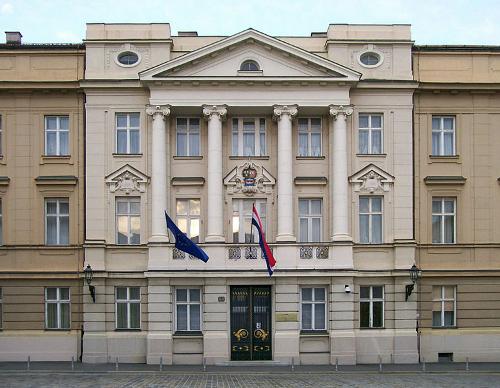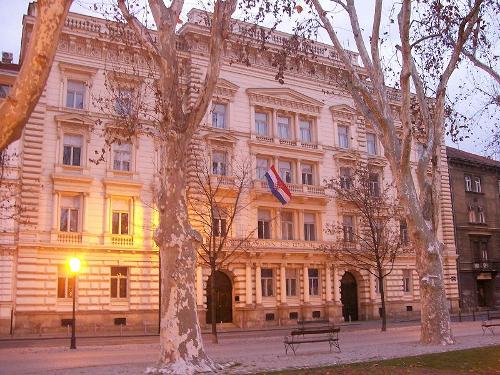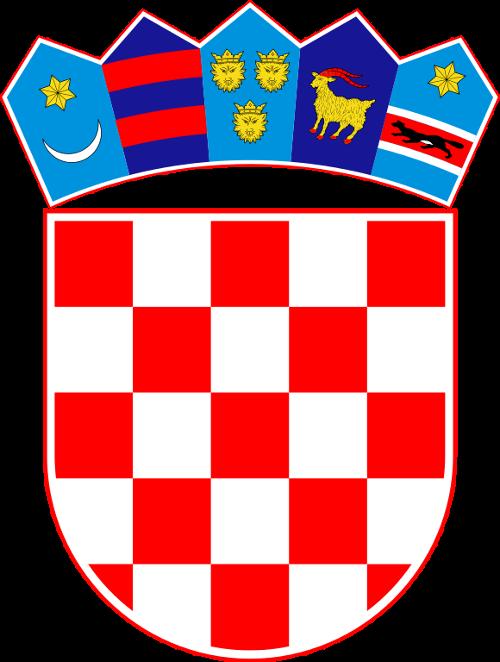CROATIA
Society

Society
Cities in CROATIA
| Dubrovnik | Porec | Pula |
| Split | Zadar | Zagreb |
General
 Parliament of CroatiaPhoto: Suradnik13 CC 4.0 International no changes made
Parliament of CroatiaPhoto: Suradnik13 CC 4.0 International no changes made
According to the 1990 constitution, Croatia is a unified, indivisible, democratic and social state with full sovereignty. The head of state is the president, who is directly elected for five years. He determines foreign policy and is commander in chief of the armed forces. The Prime Minister and the other members of the cabinet are appointed and dismissed by him on his proposal. He can declare a state of emergency in certain cases. He is accountable to parliament. Legislative power rests with the Sabor, a bicameral parliament consisting of a House of Representatives, whose members are elected partly directly, partly through representative elections for four years, and a House of Councillors with 68 indirectly elected members. The right to vote is available to all from the age of 18. There is a 5% electoral threshold. Croatia is divided into 20 regions and a capital area. Croatia is a member of the United Nations and a number of sub-organizations of the UN, the Organization for Security and Cooperation in Europe and, since 1996, of the Council of Europe.
State structure
 Building of the supreme court in Zagreb, CroatiaPhoto: Suradnik13 CC 3.0 Unported no changes made
Building of the supreme court in Zagreb, CroatiaPhoto: Suradnik13 CC 3.0 Unported no changes made
The December 1990 constitution (amended several times, most recently in 2001) prescribes the separation of powers in Croatia.
The legislative power is formed by the parliament, the Sabor. The Sabor has been a single chamber since April 2001 and currently has 151 members. Members are elected for a period of 4 years. Until April 2001, the Sabor consisted of a higher house and a lower house; the mandate of the upper house then expired and was not renewed. Constitutional amendments, adopted in 1997, include a ban on the re-establishment of a union of Yugoslav states. Parliament is responsible for passing and amending the Constitution, passing laws, the budget and issues of national borders, war and peace. Parliament oversees the work of the government.
Executive power rests with the head of state (the president) and the ministers. The president is elected for a period of 5 years and previously had quite broad powers in the field of foreign policy and domestic administration. Because of the wide powers of the President, Croatia's political system has often been described as “semi-presidential”. In the meantime, a number of restrictions have been implemented in the power of the president, partly under the influence of the current holder of this office (a purely ceremonial interpretation is not expected, however). The government is formed by the ministers and the prime minister. The government sets the budget, proposes bills and implements the Sabor laws and regulations that have been passed. The government is accountable to both the president and Sabor.
The judiciary is independent and is divided into three levels: the local courts, the district courts, and the Supreme Court. The judges of the Constitutional Court are elected by the Sabor for a term of 8 years. The Supreme Court is responsible for the uniform implementation of the laws and for equal rights for all citizens.
Politics
 Coat of arms CroatiaPhoto: Public domain
Coat of arms CroatiaPhoto: Public domain
The parliamentary elections in January 2000 were largely won by the Social Democratic Party (SDP) and the Croatian Social Liberal Party (HSLS), which took part in the election with a joint list of candidates. The victory was partly due to a voter protest against the HDZ. In addition to the overwhelming victory of the SDP and the HSLS, 4 other moderate parties, namely HSS, IDS, LS and HNS won extra seats. These six parties formed a coalition together. A painful defeat in local elections in May 2001 led to the resignation of the IDS in June 2001.
The arrival of the Racan government in 2000 brought about a marked revolution in Croatia. Major changes were made in both domestic and foreign policy: implementation of an economic recovery program, a comprehensive legislative adjustment program (especially those that discriminate against minorities), promotion of the return of refugees and displaced persons, screening of the security services and renewal of media legislation (including reorganization of state broadcaster HRT into public broadcaster). On an international level, a course was set to improve cooperation with the ICTY, to comply with the Dayton Agreements and to improve relations with the European Union and neighboring countries, in particular Bosnia and Herzegovina.
While the international community welcomed these developments, Racan was dogged domestically by domestic political tensions. The contradictions between the coalition partners SDP and HSLS sharply increased after the return of HSLS party leader Budisa to the political power center in Croatia. He resigned in the summer of 2001 following the government decision to comply with the extradition request from the ICTY concerning two suspected generals. However, in February 2002, Budiša won re-election to the HSLS party leadership so he could return to the political scene. Budiša took over from his party member Granic and became deputy prime minister herself. In addition, at the insistence of Budiša, a number of HSLS ministers were replaced by fellow party members from the right wing of the party. In the period that followed, relations in the coalition deteriorated.
This new policy was implemented by the cabinets Racan I and II (Social Democratic Party). In 2003 the HDZ, the party that had by now clearly marked the end of the Tudjman era and was sailing a pro-Western course, came back to power. Full integration in Euro-Atlantic structures was the motto. Despite the fact that the ruling party HDZ remains the largest party, it was considered a loser in the local elections in May 2005, because it had to give up government in a number of provinces and cities. After the death of Tudjman and the formation of the new coalition, Croatia is gaining international prestige. On 7 November 2007, the European Commission released a report on the progress of reforms in Croatia. As progress has been made, Croatia is increasingly becoming a serious candidate for accession. For example, the country has implemented reforms in public administration and amended laws and regulations.
Croatia has also continued the fight against corruption. Croatia has taken further steps to address the problems with minorities and refugees. Further progress is still needed in these areas. The country fully cooperated with the Yugoslavia Tribunal. However, the increased imbalances in the trade and balance of payments still pose a threat, according to the Commission.
The current political situation is described in the chapter history
Sources
Encarta Encyclopedie
Oliver, J / Croatia
Lonely Planet
Waard, P de / Reishandboek Kroatie
Elmar,
CIA - World Factbook
BBC - Country Profiles
Copyright: Team The World of Info